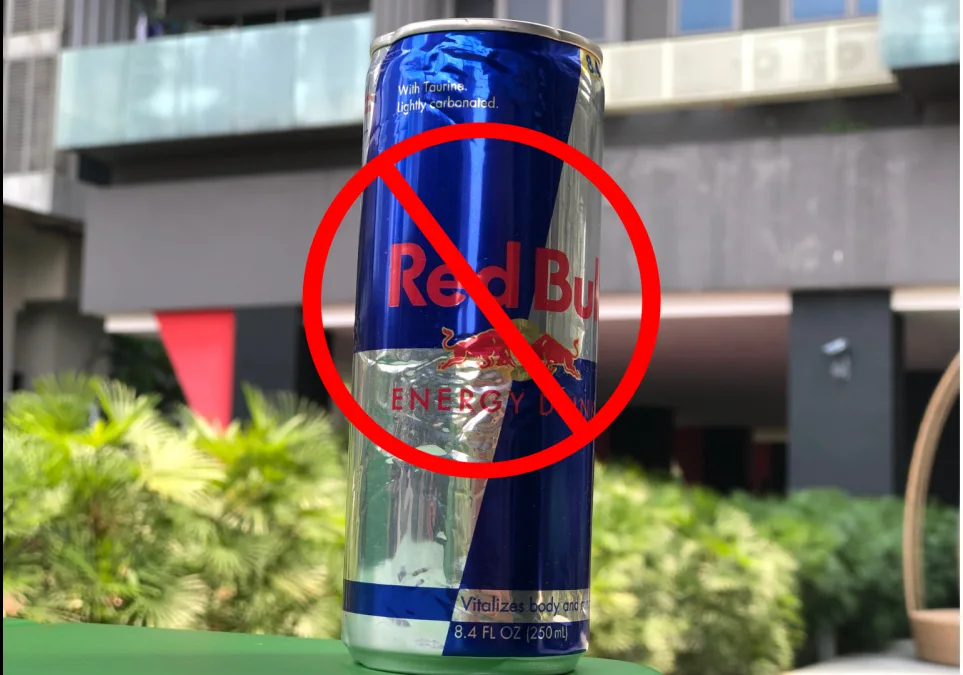Red Bull is a prominent brand in the energy drink community. No athlete, student, or night-owl is a stranger to this energy drink.
However, despite its popularity, it’s been under fire by several countries for having been linked to health concerns and even deaths.
In 2000, a youngster from Ireland died after downing three cans of Red Bull. Although there was no evidence that the energy drink was responsible for the youngster’s death, this was still enough for the European Committee to raise its eyebrows at the drink and its contents.
Particularly at the ingredient Taurine. This resulted in the drink getting banned from several countries, mainly France and Denmark.
To sum it up, the drink was banned because of health concerns raised by authorities regarding the ingredient Taurine, a frequent component in Red Bull.
But is Taurine actually dangerous? Was France justified in banning the energy drink? Keep reading to find out.
Contents
Taurine In Red Bull
Like other energy beverages, Red Bull includes caffeine, sugar, B-Vitamins, and, most importantly, Taurine, which is the main component that generated controversy in various countries, causing the drink to be prohibited.
What Is Taurine?
Taurine is an organic compound present in various foods and is frequently added to energy drinks. Taurine has been found to offer various health advantages, including a decreased risk of certain illnesses and enhanced athletic performance.
Though there are some theories that the Taurine in Red Bull comes from the sperm of a bull, this is not entirely true. Red Bull says that the Taurine in their energy drink is synthesized by pharmaceutical businesses, ensuring the greatest benchmarks.
Red Bull contains roughly 1000 mg of taurine, while the recommended daily dose of taurine is 3000 mg. This shows that Red Bull has a safe quantity of Taurine as it is less than the required dosage.
Why is Taurine in Energy Drinks?
The recurring presence of Taurine in energy drinks is due to the belief that Taurine improves physical performance. As energy drinks are primarily advertised to athletes, this little tidbit is a huge selling point.
A study also showed that Taurine can improve cognitive performance and boost one’s mood, which is another important selling point for energy drinks companies.
However, despite its advantages, Taurine appears to be outlawed in a few European nations like France.
Why is that?
Why Is Taurine Banned In Some Countries?
Taurine is banned in some countries due to the implications that it might be a health risk.
Although this implication has never been proven and the negative effects of Taurine are still unknown, health officials are still wary that it may cause some sort of health problem.
To know more about Taurine, here’s a video you can watch:
Why Is Red Bull Banned In Some Countries?
Red Bull is banned in some countries because it contains Taurine, an ingredient in energy drinks that health professionals are concerned with.
Red Bull has also been linked to deaths owing to its copious amount of caffeine and other stimulants.

Furthermore, the European Commission’s Scientific Committee on Food performed a study that concluded that while caffeine levels in energy drinks were acceptable, more research was required to investigate the dangers of taurine and glucuronolactone.
Only France, Denmark, and Norway have outlawed the beverage. Red Bull was evaluated by Britain’s Committee on Toxicity in 2001 and was deemed safe. However, pregnant women were advised not to consume it since excessive caffeine intake has been related to a risk of miscarriage.
Is Red Bull Bad For You?
Red Bull is neither terrible nor beneficial for you. It is only useful for momentarily easing and relieving weariness, but it is harmful if consumed in excess.
Red Bull is typically harmless, but it may become hazardous and immediately affect you when combined with alcohol (as many people do at parties or concerts).
Even though Red Bull is surrounded by controversy, it is typically safe to drink.
As long as you consume it with caution and moderation, Red Bull is a safe drink. However, if you’re not a fan of Red Bull, you can always try other energy boosters like coffee.
Here’s an article I wrote comparing coffee and Red Bull if you are interested to read about their differences.
Red Bull Pros and Cons
Here’s a quick rundown of the pros and cons of Red Bull, to help you figure out if it suits you.
| PROS | CONS |
| Increases energy | Increased blood pressure |
| Increases attentiveness | Risk of type 2 diabetes |
| Improves memory | Caffeine overdose |
| Increases response time | Tooth decays |
| Improves moods |
These advantages and disadvantages can also apply to all energy drinks. So, although energy drinks are beneficial, the negative side effects should serve as enough caution for us to take them properly.
Are There Any Healthy Energy Drinks?
Despite the popularity of energy drinks, the phrase “healthy energy drinks” is quite misleading. If there is a line between healthy and unhealthy, energy drinks stand on that line.
The sole purpose of an energy drink is to provide, as said in their name, energy. They have no nutritional value, therefore, cannot be labeled healthy, but they also pose zero health threats to people who drink them responsibly, therefore they cannot be called unhealthy.
They are simply just energy drinks.
However, the negative effects of the ingredients in energy drinks are unavoidable.

Caffeine, one of an energy drink’s primary ingredients, can cause:
- Insomnia
- Palpitations
- Anxiousness
- Nausea
- Hallucinations
- Headache
- Dysphoria
That is if it’s taken excessively. In order to avoid these negative effects, one must adhere to the limit set by the FDA, which is 400 mg.

Sugar is also something that is often found in energy drinks that might cause negative effects. Like:
- Weight gain
- Cancer
- Aging
- Acne
To make sure these effects are avoided, follow the limit set by AHA which is 36 grams for men, and 25 grams for women.
Why are energy drinks banned in Europe?
Energy drinks are not banned in Europe, but they are regulated more strictly than in some other parts of the world, including the United States. The European Union (EU) has established regulations for the labeling, advertising, and sale of energy drinks that are intended to protect consumers, particularly young people, from the potential risks associated with excessive consumption of caffeine and other ingredients commonly found in energy drinks.
In 2018, the European Food Safety Authority (EFSA) published a report on the safety of caffeine consumption, which identified some potential risks associated with high levels of caffeine consumption, particularly among children and adolescents. As a result, some countries in Europe have introduced additional regulations, including age restrictions on the sale of energy drinks, limits on the caffeine content of drinks, and warnings about the potential health risks associated with excessive consumption.
Is Red Bull illegal in Europe?
No, Red Bull is not illegal in Europe. Red Bull is a popular energy drink that is sold legally in most countries around the world, including in Europe. However, as I mentioned earlier, there are some regulations in place in the European Union (EU) that govern the sale, labeling, and advertising of energy drinks, including Red Bull.
These regulations are designed to protect consumers, particularly young people, from the potential risks associated with excessive consumption of caffeine and other ingredients commonly found in energy drinks.
Is it OK to drink a Red Bull a day?
It is generally considered safe for most healthy adults to consume moderate amounts of caffeine, including the amount found in a standard serving of Red Bull (80 mg of caffeine per 8.4 fl oz can). However, it’s important to keep in mind that consuming too much caffeine can have negative health effects, such as increased heart rate, high blood pressure, and sleep disturbances.
In addition to caffeine, energy drinks like Red Bull contain other ingredients, such as sugar and various herbal supplements, that can also have potential health risks if consumed in excessive amounts. For example, consuming too much sugar can lead to weight gain, dental problems, and an increased risk of developing type 2 diabetes.
Is Red Bull Safe To Drink?
Red Bull is safe to drink if taken in moderation.
Following the lifting of the prohibition, Red Bull stressed the safety of their product, pointing out that it is now marketed in over 170 countries, including every EU member state.
They further stated that the caffeine in Red Bull is a reasonable level (80mg), comparable to the caffeine in a cup of coffee and that every component on the can is listed.
If you want to know more about Red Bull, I have an article reviewing said energy drink. You can check it out or watch this detailed review by CaffeineMan:
Conclusion
Red Bull has been in quite a few controversies due to its ingredients.
Though there is still not that much evidence as to whether Red Bull is dangerous or not, countries such as France have kept a close eye on the drink.
Taurine, which was what caused the uproar, has proven advantages yet is still banned from several countries as it might be a health risk.
Energy drinks, such as Red Bull, poses no threat to our health as long as they are taken moderately.
